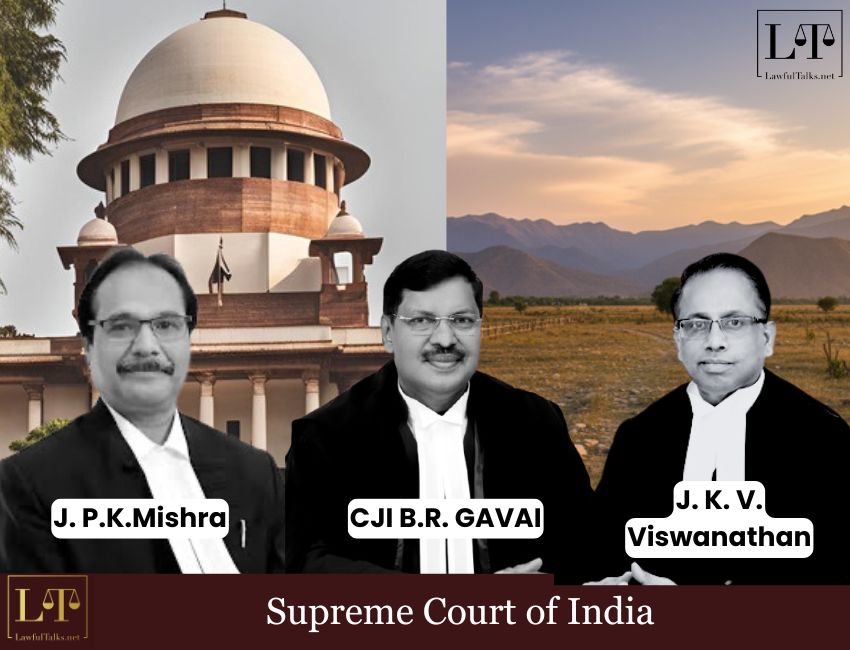Allahabad HC Sets Aside Afzal Ansari's Conviction, Allows Him to Continue as MP

In a significant judgment bringing relief to Haryana-based landowners, the Supreme Court has ruled that any ‘bachat land’- the land left unused after marking plots for common use during consolidation- must be redistributed/given back to the original proprietors in proportion to the land they had contributed. The ruling reinforces that if the leftover land is not formally reserved for common use and its possession is not transferred to the Panchayat, the title continues to vest in the original landowners.

Background:
The dispute arose under the East Punjab Holdings (Consolidation and Prevention of Fragmentation) Act, 1948, which required villagers to contribute part of their holdings to create a common pool of land for public purposes such as roads, schools, or grazing fields. During consolidation, any leftover land after meeting these needs came to be known as ‘bachat land’.
In 1992, the Haryana government amended the Punjab Village Common Lands (Regulation) Act, 1961, expanding the definition of shamilat deh (village common land) to include such contributed portions. This move was challenged by landowners, who argued that the amendment was effectively a means for the State to appropriate unused land without offering compensation.
The Punjab & Haryana High Court ruled in favor of the proprietors, holding that unless the unutilized land was expressly reserved for common purposes and handed over to the Panchayat, it would continue to vest in the contributors. The State of Haryana appealed against this decision before the Supreme Court.
A bench comprising Chief Justice BR Gavai and Justice PK Mishra and Justice KV Viswanathan upheld the High Court’s judgment, dismissing the State’s appeal. Relying on the Constitution Bench decision in Bhagat Ram & Ors. v. State of Punjab & Ors. (1967) 2 SCR 165, the Court reiterated that proprietors retain rights over bachat land.
The Court observed: “All these decisions had held that the land which remains unutilized after utilizing the land for the common purposes so provided under the consolidation scheme vests with the proprietors and not with the Gram Panchayat. It was further held that the unutilized land i.e., the bachat land, left after utilizing the land earmarked for the common purposes, has to be redistributed amongst the proprietors according to the share in which they had contributed the land belonging to them for common purposes.”
The Court further stated:“We have therefore no hesitation in holding that no error could be noticed in the impugned judgment and final order of the Full Bench of the High Court to the extent that it holds that the lands which have not been earmarked for any specific purpose do not vest in the Gram Panchayat or the State.”
Additionally, the Court stressed that for the Panchayat to use bachat land, two conditions must be met:
-
The land should be expressly reserved for common purposes in the consolidation scheme.
-
Possession must be formally transferred to the Panchayat.Since these requirements were not satisfied in the present case, ownership of the land remained with the proprietors.
The Supreme Court also stressed the need for legal certainty by applying the doctrine of ‘stare decisis’. It noted that more than 100 judgments of the Punjab & Haryana High Court have consistently upheld landowners rights over bachat land, following the Bhagat Ram ruling. Disturbing this settled position, the Court held, would undermine stability and fairness in the legal system.
As the judgment put it:“The Full Bench of the High Court in the impugned judgment and final order in the alternative held that, a consistent view has been taken in more than 100 judgments by the Punjab and Haryana High Court and applying the doctrine of stare decisis, such a view cannot be upset.”“The doctrine of stare decisis lays importance on stability and predictability in the legal system and mandates that a view consistently upheld by courts over a long period must be followed, unless it is manifestly erroneous, unjust or mischievous.”
Case Details : THE STATE OF HARYANA Vs. JAI SINGH AND OTHERS

Pallavi Zende
Law Student
Latest Posts
Categories
- International News 19 Posts
- Supreme Court 390 Posts
- High Courts 383 Posts



















































































































































































































































































































































































































































































































































































































































































































































































































